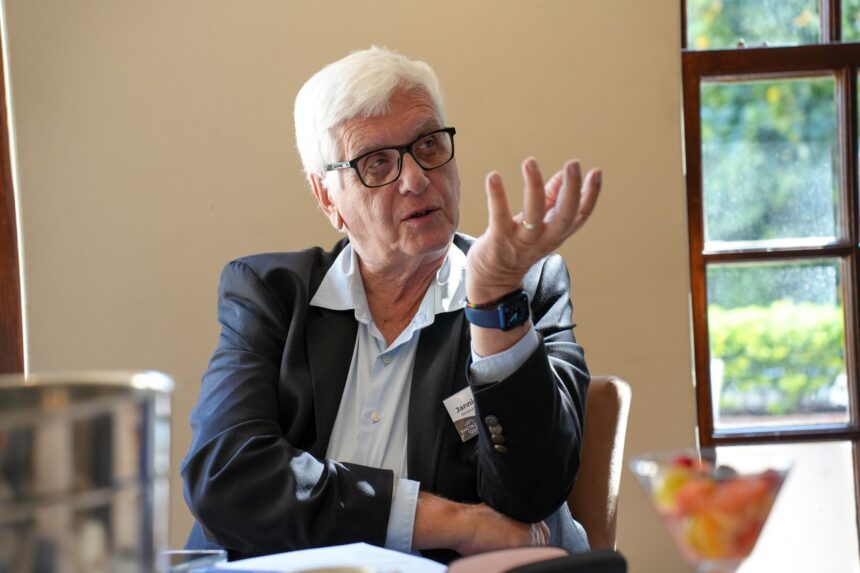Johannesburg 13 November 2025 When a young coder in Mthatha can work on the same project as a climate scientist in São Paulo or a health researcher in Pretoria, something powerful starts to happen, knowledge stops being confined to borders, and innovation becomes a shared global exercise.
It is only through collaboration that we can unlock the possibilities technology and innovation offer to help solve some of the world’s greatest challenges while moving towards meeting the United Nations’ Sustainable Development Goals.
Within the G20, a way of linking innovation systems across countries to promote equitable access to science and technology and drive sustainable development is being developed.
The importance of this Open Innovation Platform of Platforms (OIPoP) cannot be overstated, and it’s exciting to see countries and associations already working together to connect existing national, regional, and international innovation platforms in a coordinated way rather than haphazardly.
With South Africa at the helm of the G20, this initiative is currently being driven by the Council for Scientific and Industrial Research (CSIR) – the leading scientific and technology research organisation in South Africa – under the auspices of the Department of Science and Technology.
It’s gratifying to see our country so involved in helping create a platform that enables shared knowledge. It’s even more gratifying to know we will benefit from its work, helping us develop vital and cutting-edge technology and, more importantly, bringing women, people with disabilities, and historically disadvantaged communities into the realm of STEM solutions.
Established during Brazil’s G20 Presidency in 2024 under the theme “Open Innovation for a Just and Sustainable Development,” the concept of an OIPoP builds on India’s theme of “Research and Innovation for Equitable Society.” In South Africa, the concept and ways of working are being further developed through our theme: “Solidarity, Equality and Sustainability”.
And that’s the point.
Through a series of G20 stages and meetings, including a working group that convened in September, progress is being made towards entrenching the concept that we need to collectively pool our knowledge to innovate for a better society. When we work together across the world, it becomes possible to bridge gaps in access, equity, and collaboration in science and innovation.
This meta-network is set to support innovative solutions to tackle global challenges such as climate change, biodiversity conservation and bioeconomy development, disaster risk reduction and resilient infrastructure, as well as public health.
To make this concrete, imagine:
- A South African team using global climate and agricultural data to build AI tools that help smallholder farmers in Limpopo adapt to shifting rainfall patterns.
- A local start-up co-developing affordable medical devices with partners in Asia and Latin America, using shared research facilities and open datasets.
- A young woman with a disability in a township accessing online mentorship and research collaborations that would previously have required money, travel, and networks she simply did not have.
The OIPoP can help make scenarios like these not the exception, but the norm. And it will do this in an equitable way through equal access to technology. Women, people with disabilities, and researchers from developing countries are underrepresented in global science and innovation networks, and it is our sincere hope that an open access network will bring more marginalised people into the fold.
What gives me hope is that heavy-hitting partners are already on board.
Names ranging from the familiar to the niche are set to get involved: the UN’s Educational, Scientific and Cultural Organization (UNESCO), the United Nations Conference on Trade and Development (UNCTAD), the International Centre for Genetic Engineering and Biotechnology, the African Open Science Platform hosted by the National Research Foundation, as well as our own Technology Innovation Agency, among others.
This is important because it gives impetus to the concept. It helps push it forward and ensures it doesn’t become just another idea that doesn’t go beyond meetings that develop subcommittees, which create more committees, and then stall.
The immense potential that OIPoP offers will result in South Africa’s already talented scientists and technologists learning more, advancing knowledge among our scientific community, and extending the opportunities this path brings to marginalised people who simply don’t have the wherewithal to follow a STEM career.
If the platform becomes a serious reality, it will make science and innovation more inclusive by opening access to resources and collaboration networks that have long been out of reach for many.
By connecting global and national innovation systems, it helps democratise participation so that innovators, students, and entrepreneurs from marginalised or under-resourced communities can find pathways into research, skills development, and problem-solving initiatives that were previously inaccessible.
For people who lack the means or opportunity to pursue formal STEM studies, the platform extends opportunity through open access to data, shared research tools, and community-based innovation programmes. A student at a TVET college, a teacher in a rural school, or a community-based innovator working on local water purification could all, in time, plug into the same reservoirs of knowledge as their counterparts in the world’s most advanced laboratories.
With support from partners such as UNESCO and UNCTAD, OIPoP fosters local innovation, capacity building, and mentorship, ensuring that talent and ideas from all corners of society can contribute to and benefit from global advances in science and technology.
But this will not happen automatically. It will require South African universities, research councils, industry associations, and the private sector to lean in: to contribute data, co-create programmes, and actively invite in those who have been left on the margins of our innovation system.
It really can open the door. Let’s ensure this door is wedged open so that the talent we have and can nurture will enable us to make sound contributions to the future of technology and innovation, not just as beneficiaries of global progress, but as active and equal partners shaping it.
Email Us on editorial@nnafrica.com












